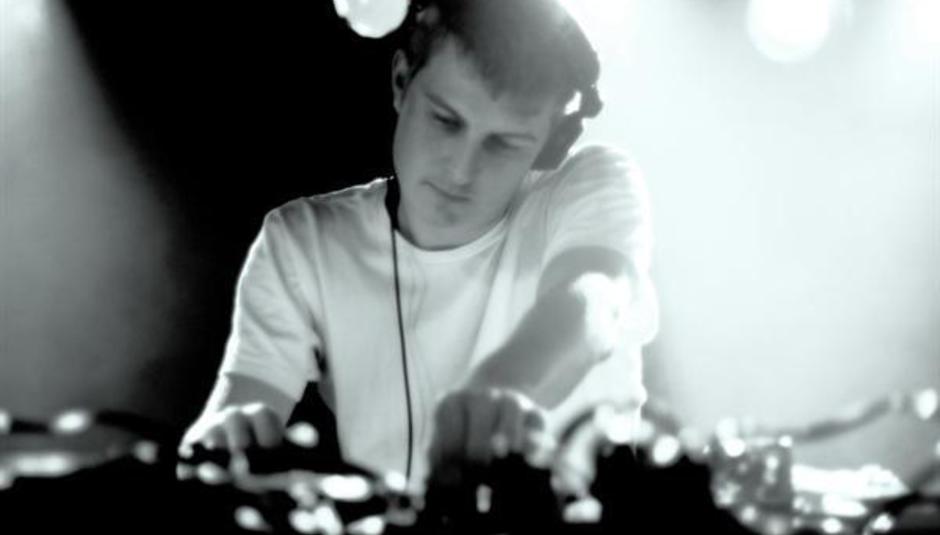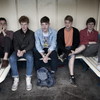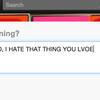This edition of armchair dancefloor marks a convergence point. As the dividing lines between what does and doesn’t constitute ‘bass music’ grow ever thinner, it feels like a worthwhile exercise to incorporate our bass column, Subliminal Transmissions, into a thicker, heavier and more muscular single beast. So here we have it: still rounding up the best in experimental and electronic sounds, armchair dancefloor will now also feature interviews, thoughts and ideas about the UK scene’s current state of play. So to kick off this week, we launch straight into a chat with Bristolian bass crossover man Addison Groove, who performs live at BLOC this weekend...
One of the most interesting developments in dubstep circles last year was a sudden influx of influence from Chicago’s footwork scene, a strange, gritty cousin of the city’s long-running juke sound. Characterised by rapid 808 drum patter and relentlessly looped samples, footwork’s peculiar asymmetric groove and tendency to avoid straight four-to-the-floor beats in favour of dizzying polyrhythms make for a sound that borders on psychedelic. That’s perhaps an appropriate way to view it, given that many of the sound’s younger practitioners are bedroom producers, using rough-hewn cut-and-paste techniques. Since arriving in the UK in the middle of last year with releases on Planet Mu it’s become something of a vogueish reference point, with anyone making music with a pronounced electro or drum machine sound immediately proclaimed as ‘footwork-influenced’. But it was Tony Williams’ music as Addison Groove that first turned the UK’s attention towards Chicago, with last year’s ubiquitous ‘Footcrab’ setting the dubstep scene ablaze in the run up to its release on Loefah’s Swamp81 label.
Williams has moved further than any other producer towards creating a seamless synthesis of the two genres. His earlier music under the Headhunter alias mined the middle ground between dubstep and Berlin techno, greyscale dub chords set adrift above buoyant sub-bass – it slotted neatly alongside the rest of the Bristol scene at the time, where the likes of Appleblim and Peverelist were producing rolling grooves that implied a collision of worlds. By late 2009 though, that sound was starting to collapse inward, slowing down to come more closely into contact with house. ‘Footcrab’, with its whirling vocal sample and pulsing low-end, was something different again, earthier and possessed of a manic energy that evoked the restless spirit of jungle as much as it did footwork’s dancefloor mania. Surprisingly given his long-running presence in the scene, its massive reaction suddenly turned a huge amount of attention towards Williams’ music.
“I was shocked,” he admits via email. “But at the same time I definitely had a vision to get juke and dubstep together – juke was pretty much an untapped bass music genre in the UK, which is amazing, as the UK seems to thrive off anything progressive and bassy. The whole vibe Chicago footwork carries was what got me into it. Less emphasis on the DJ and more on the dancing, a bit like grime really.”
Along with other long-running producers on Swamp81 – Ramadanman, Pinch and Instra:mental’s Boddika – Williams’ edgy electroid sound has established itself as one of the most exciting avenues leading outward from the dubstep scene. “It’s gained a lot of interest,” he agrees. “People have trusted the DJs. And the most important things for me are the gigs – I can now go out and play 130-160 bpm without anyone asking for their face to be melted [by wobble tracks].”
Although the sudden spike in attention last year was a surprise, it came as the result of years’ worth of dedication to DJing and production, he explains. “DJing came before producing, back when I was about thirteen or fourteen, “ he explains. “That’s all I wanted to be, I neglected school and chose a life on pirate radio and record shops. A few years later it seemed as if to get anywhere you needed to be a producer. Andy C was a big influence in that respect, it was clear he was the leader of the d’n’b scene I was fully into, and he was credited as producer before DJ. That was a big shift in the music, the producers became the forefront. Nowadays, it’s only producers who get the bookings, with very few exceptions – Youngsta, Oneman and Jackmaster, for example.”
When he started producing as Headhunter, he was signed by Tempa for a number of releases including debut album Nomad, which despite its monochrome sheen still bore hallmarks of the sound he’d develop as Addison Groove. In particular, running in the background many of his tracks as Addison Groove are chilly, sustained synth drones that lend his music a peculiar sense of sprawling momentum. Though the ghetto house connection remains strongly audible on a track like the rapid-fire ‘Work It’, its subtle acid backdrop aligns it easily with one of his most well known Headhunter tunes, the coolly anthemic ‘Prototype’.
BR #42 Addison groove by BOILER ROOM
Since ‘Footcrab’s release, alongside ultra-percussive B-side ‘Dumbshit’, Addison Groove’s been pretty quiet on the release front, instead honing his DJ set and live show to incorporate an ongoing raft of new and unreleased tracks. His recent live set for the Boiler Room is evidence of how far his sound’s developed – based around Ableton and an 808, his tracks’ manic drum patterns stack up upon one another before suddenly darting off at different angles. And with ‘Work It’ finally seeing release on Swamp this month, backed with the glorious build-and-release of ‘Sexual’, and new 12”s upcoming on Tectonic and 3024 in the near future, expect to hear far more Addison Groove in the coming months.
Addison Groove plays live at BLOC this weekend (11th-13th March) at Butlins, Minehead.
Peaking Lights – 936 [Not Not Fun]
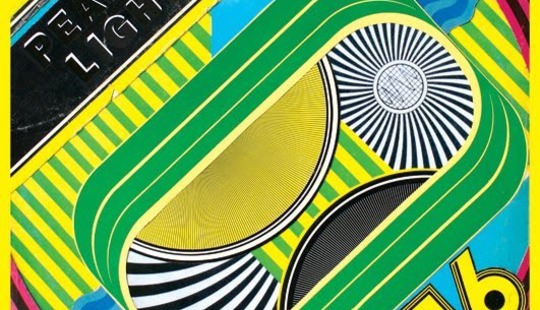 Not Not Fun’s growing popularity is well deserved, especially after the last six months or so, with a string of stunning releases (and the birthing of sister ‘dancefloor’ label 100% Silk). Sun Araw’s hypno-funked On Patrol, the heatshocked sprawl of Ensemble Economique’s Psychical and, most recently, LA Vampires & Matrix Metals’ glorious So Unreal all offered individual visions of the US underground, operating within different fields but sharing ambitions a million miles from self-conscious ‘lo-fi-for-lo-fi’s-sake’ attitudes. In the context of these records, and similar others from labels like Olde English Spelling Bee, love of cassettes and hazy analogue recording are framed as attempts to move away from the throwaway nature of digital media, less about conforming to an imagined hipster agenda than about wishing to tap into the physically tangible and timeless.
Not Not Fun’s growing popularity is well deserved, especially after the last six months or so, with a string of stunning releases (and the birthing of sister ‘dancefloor’ label 100% Silk). Sun Araw’s hypno-funked On Patrol, the heatshocked sprawl of Ensemble Economique’s Psychical and, most recently, LA Vampires & Matrix Metals’ glorious So Unreal all offered individual visions of the US underground, operating within different fields but sharing ambitions a million miles from self-conscious ‘lo-fi-for-lo-fi’s-sake’ attitudes. In the context of these records, and similar others from labels like Olde English Spelling Bee, love of cassettes and hazy analogue recording are framed as attempts to move away from the throwaway nature of digital media, less about conforming to an imagined hipster agenda than about wishing to tap into the physically tangible and timeless.
It’s that same attitude that buoys vinyl culture within certain dance music scenes, especially those that tie into dub-informed soundsystem lineages. So it’s interesting to note the convergence between the tone of Not Not Fun’s recent releases and, say, dubstep’s focus on vinyl as the optimum method of musical delivery. All three – alongside the label’s latest release, Peaking Lights’ swampy, immersive 936 – are positively steeped in dub, both as sound and as idea. 936 is, to many intents and purposes, a dub album; its echo chamber rattle and sense of space just beyond the edges of perception point suggest subtle (and not-so-subtle) studio trickery. But it’s dub as take on US underground noise and pop, highlight ‘Amazing & Wonderful’ allowing Indra Dunas’ dusty vocal to drift lazily in a shroud of guitar and bass fuzz. ‘Birds Of Paradise Dub Version’ confirms the notion: driven by a skeletal rhythm section, fragments of guitar and voice flit, untethered, through its core. The whole album is simultaneously sophisticated and earthy, a contradiction that surprisingly elicits no hints of dissonance. A record to get lost in.
Ensemble Economique – To Feel The Night As It Really Is [digital only]
 As mentioned above, Ensemble Economique’s Psychical was one of last year’s surprise highlights, and remains glued to my stereo months after its release. A dark and trippy excursion through the outer limits of noise, dub and psych, its heavily percussive nature and aura of barely restrained chaos set it somewhere between the rolling beatscapes of Shackleton and the smacked-out thrum of Oneida’s Rated O. This new digital only single is a complete departure from its blood-red skies: ‘To Feel The Night As It Really Is’ consists of little other than four-note synth drift and rolling drum groove, but it’s beautiful and sad in equal measure, and a tantalising taste of where EE’s sound may head next.
As mentioned above, Ensemble Economique’s Psychical was one of last year’s surprise highlights, and remains glued to my stereo months after its release. A dark and trippy excursion through the outer limits of noise, dub and psych, its heavily percussive nature and aura of barely restrained chaos set it somewhere between the rolling beatscapes of Shackleton and the smacked-out thrum of Oneida’s Rated O. This new digital only single is a complete departure from its blood-red skies: ‘To Feel The Night As It Really Is’ consists of little other than four-note synth drift and rolling drum groove, but it’s beautiful and sad in equal measure, and a tantalising taste of where EE’s sound may head next.
Lucy – Wordplay for Working Bees [Stroboscopic Artefacts]
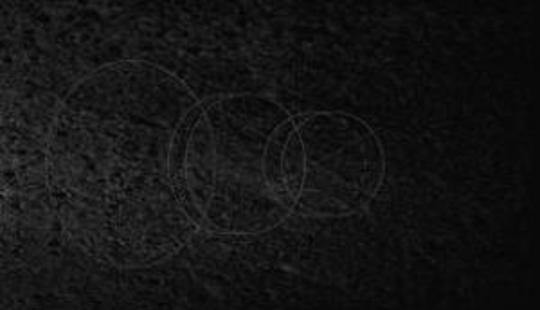 Some of the most interesting and exciting techno that’s emerged recently has avoided falling into the tyranny of straight four-to-the-floor in favour of exquisitely flexible broken percussion. Berlin maestro Shed’s music is a prime example, as is the funky clip of some of Horizontal Ground’s contributors (particularly Szare, whose ‘Snake Cave’ was among last year’s finest, strangest tracks). Lucy is also based in Berlin, and his music retains hallmarks of that city’s techno heritage – post-industrial bleakness, greyscale colouration and earth-shattering intensity. On debut album Wordplay For Working Bees, though, those traits are channeled through an experimental sensibility that aligns him with the likes of Shackleton and the aforementioned Szare. Alternating between swung dancefloor tracks like ‘Bein’, with its percussion ricocheting like raindrops off a moving car’s windscreen, and sumptuous sample-based drone, it achieves a stately grandeur while remaining mindful of its warehouse basement roots. A great deal of its depth comes from its source material, which draws heavily upon field recordings and the concept of finding musicality within the mundane and the everyday. In that light, the Stockhausen sample which opens the record - "whenever we hear sound we are changed; we are no longer the same" - draws attention to tiny sonic intricacies that flicker throughout. And crucially, it’s an album in the proper sense of the word; while individual tracks shine on their own, each is enhanced by the others around it, making for a sinister, deeply engrossing experience.
Some of the most interesting and exciting techno that’s emerged recently has avoided falling into the tyranny of straight four-to-the-floor in favour of exquisitely flexible broken percussion. Berlin maestro Shed’s music is a prime example, as is the funky clip of some of Horizontal Ground’s contributors (particularly Szare, whose ‘Snake Cave’ was among last year’s finest, strangest tracks). Lucy is also based in Berlin, and his music retains hallmarks of that city’s techno heritage – post-industrial bleakness, greyscale colouration and earth-shattering intensity. On debut album Wordplay For Working Bees, though, those traits are channeled through an experimental sensibility that aligns him with the likes of Shackleton and the aforementioned Szare. Alternating between swung dancefloor tracks like ‘Bein’, with its percussion ricocheting like raindrops off a moving car’s windscreen, and sumptuous sample-based drone, it achieves a stately grandeur while remaining mindful of its warehouse basement roots. A great deal of its depth comes from its source material, which draws heavily upon field recordings and the concept of finding musicality within the mundane and the everyday. In that light, the Stockhausen sample which opens the record - "whenever we hear sound we are changed; we are no longer the same" - draws attention to tiny sonic intricacies that flicker throughout. And crucially, it’s an album in the proper sense of the word; while individual tracks shine on their own, each is enhanced by the others around it, making for a sinister, deeply engrossing experience.
Actress – Harrier ATTK/Gershwin [Nonplus+]
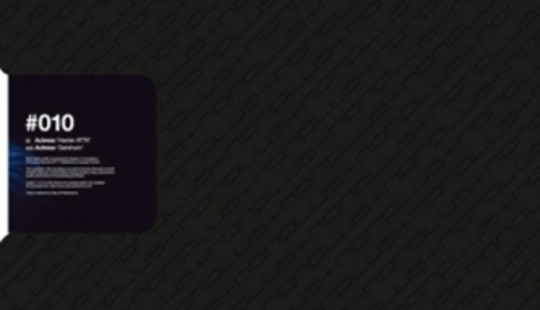 Unlike the organic feel of his Honest Jons releases, Darren Cunningham’s music for Nonplus+ tends towards static-addled mechanical funk, fitting neatly with the label’s general aesthetic and the decayed Detroit grandeur of the Autonomic ‘sound’. Last year’s Machine & Voice EP was a welcome counterpart to his Splazsh album, emphasising the paranoid and alienated aspects of his music while retaining a soft human warmth. This new 12” follows in the same vein, ‘Gershwin’s repeating motif setting up a gloomy mood which slowly dissolves over its runtime. A-side ‘Harrier ATTK’, meanwhile, couldn’t be more perfectly named: it strafes speakers with chill bursts of static and brittle percussion, like Juan Atkins’ music as Cybotron played off a decrepit old cassette. Characteristically fantastic stuff, and apparently the first of many releases this year.
Unlike the organic feel of his Honest Jons releases, Darren Cunningham’s music for Nonplus+ tends towards static-addled mechanical funk, fitting neatly with the label’s general aesthetic and the decayed Detroit grandeur of the Autonomic ‘sound’. Last year’s Machine & Voice EP was a welcome counterpart to his Splazsh album, emphasising the paranoid and alienated aspects of his music while retaining a soft human warmth. This new 12” follows in the same vein, ‘Gershwin’s repeating motif setting up a gloomy mood which slowly dissolves over its runtime. A-side ‘Harrier ATTK’, meanwhile, couldn’t be more perfectly named: it strafes speakers with chill bursts of static and brittle percussion, like Juan Atkins’ music as Cybotron played off a decrepit old cassette. Characteristically fantastic stuff, and apparently the first of many releases this year.
Joy O – Wade In/Jels [Hotflush]
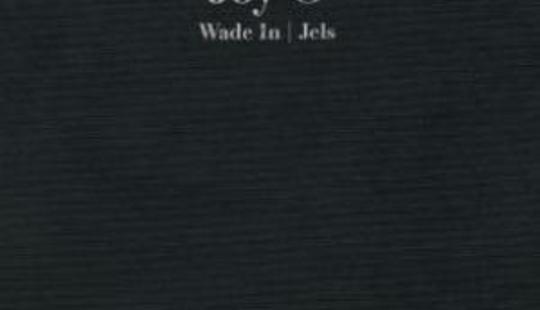 Joy O’s sound has changed a lot since his debut, ‘Hyph Mngo’, burst onto the scene with a blissful hands-in-the-air intensity still rare within dubstep circles. Even then, with his reticence and low release schedule, it appeared that he was already keen to distance himself from pigeonholing. His recent Detroit-leaning Doldrums 12” was further proof of that notion. On his return to the Hotflush label he’s completed the transformation to dedicated house producer, but also advances further still towards establishing his own identity: despite their delicate melodic touch and Motor City grooves, both tracks here show off a rugged toughness that’s distinctly UK in origin. ‘Wade In’ shows off the same acidic grind as Boddika’s music, but instead of being in thrall to the stark drum machines of Drexciya and ghetto house, it’s warm and flowing like Omar S or Kassem Mosse. ‘Jels’ is rubbery, with an elastic momentum that works as perfect foil to the jaunty piano figure that dances across its surface.
Joy O’s sound has changed a lot since his debut, ‘Hyph Mngo’, burst onto the scene with a blissful hands-in-the-air intensity still rare within dubstep circles. Even then, with his reticence and low release schedule, it appeared that he was already keen to distance himself from pigeonholing. His recent Detroit-leaning Doldrums 12” was further proof of that notion. On his return to the Hotflush label he’s completed the transformation to dedicated house producer, but also advances further still towards establishing his own identity: despite their delicate melodic touch and Motor City grooves, both tracks here show off a rugged toughness that’s distinctly UK in origin. ‘Wade In’ shows off the same acidic grind as Boddika’s music, but instead of being in thrall to the stark drum machines of Drexciya and ghetto house, it’s warm and flowing like Omar S or Kassem Mosse. ‘Jels’ is rubbery, with an elastic momentum that works as perfect foil to the jaunty piano figure that dances across its surface.
GuShee – GuShee [Otnorot]
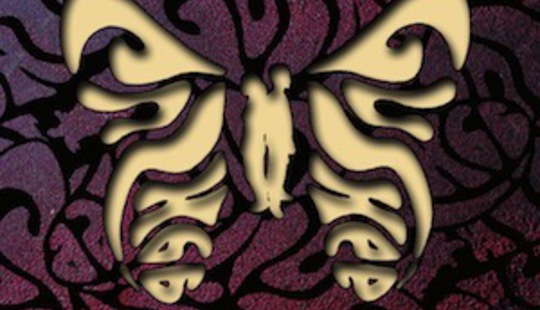 A new project from Vanese Smith alongside turntablist Cheldon Paterson, GuShee mine similar nocturnal city headspaces as Smith’s music as Pursuit Grooves – their debut album is a set of sublimely subverted slow jams, avoiding waking bravado in favour of astral exploration and all anchored by Smith’s silky, almost-out-of-tune vocals. It’s a relaxing listen despite its dark and slightly threatening tone, the stuttering glow of ‘Monday Ride’ recalling Instra:mental’s soulful drum ‘n’ bass and ‘Making Babies’ pulsing with a sReich-esque shimmer. At a little over 25 minutes and only nine tracks, it’s feels more like a set of sketches than an overarching statement, but therein lies much of its charm – GuShee works as lovely, thought-provoking mood piece.
A new project from Vanese Smith alongside turntablist Cheldon Paterson, GuShee mine similar nocturnal city headspaces as Smith’s music as Pursuit Grooves – their debut album is a set of sublimely subverted slow jams, avoiding waking bravado in favour of astral exploration and all anchored by Smith’s silky, almost-out-of-tune vocals. It’s a relaxing listen despite its dark and slightly threatening tone, the stuttering glow of ‘Monday Ride’ recalling Instra:mental’s soulful drum ‘n’ bass and ‘Making Babies’ pulsing with a sReich-esque shimmer. At a little over 25 minutes and only nine tracks, it’s feels more like a set of sketches than an overarching statement, but therein lies much of its charm – GuShee works as lovely, thought-provoking mood piece.
Blawan – Bohla [R&S]
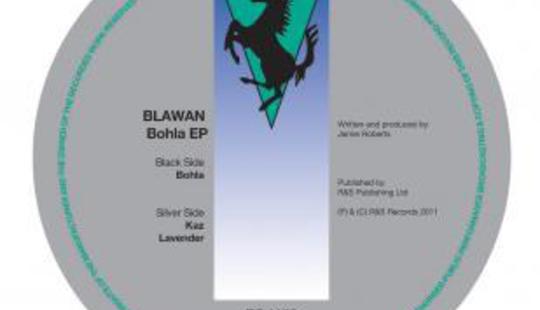 Blawan’s debut for Hessle Audio last year was striking in its borderline pathological sense of focus, quite a feat for a first release. It was percussion that really marked out his tracks as ones to watch (not to mention dance to) - tough and stringy beats that combined early dubstep’s physical intensity with a lightness of touch that’s become rarer as ‘pure’ dubstep beats have calcified. For his R&S debut he’s slowed the tempo by a full ten bpm to operate within the boundaries of house, but all three tracks drive forward with the same overbearing momentum. Lead track ‘Bohla’s been doing the rounds for a while and it’s a monster, opening with an immediately distinctive acid squiggle before suddenly leaping into the fray at full pelt. ‘Kaz’ dispatches the same trick with the same brutal efficiency, and the dull thud of a kickdrum sends ‘Lavender’ into death-rattling electro territory. Alongside Boddika and Joy O, Blawan appears to be spearheading a mini acid revival in bass styled music at the moment, which thankfully takes full advantage of the 303’s predatory instincts.
Blawan’s debut for Hessle Audio last year was striking in its borderline pathological sense of focus, quite a feat for a first release. It was percussion that really marked out his tracks as ones to watch (not to mention dance to) - tough and stringy beats that combined early dubstep’s physical intensity with a lightness of touch that’s become rarer as ‘pure’ dubstep beats have calcified. For his R&S debut he’s slowed the tempo by a full ten bpm to operate within the boundaries of house, but all three tracks drive forward with the same overbearing momentum. Lead track ‘Bohla’s been doing the rounds for a while and it’s a monster, opening with an immediately distinctive acid squiggle before suddenly leaping into the fray at full pelt. ‘Kaz’ dispatches the same trick with the same brutal efficiency, and the dull thud of a kickdrum sends ‘Lavender’ into death-rattling electro territory. Alongside Boddika and Joy O, Blawan appears to be spearheading a mini acid revival in bass styled music at the moment, which thankfully takes full advantage of the 303’s predatory instincts.
Other records armchair dancefloor is currently enjoying…
1000names’ recent Before Sunrise EP [Black Acre] finds them cranking out slo-mo boogie and hip-hop in a vaguely psychedelic vein; ‘Kaleidoscope’ is a hulking beast of a tune, propelled by a snakelike, sinuous synth line, and ‘Pocket Calculator’ staggers around in a drunken, melancholy stupor, its flickering samples like memories of a better time. Boxcutter’s Allele 12” [Planet Mu] is another example of juke and electro’s heavy drum machine influence creeping into dubstep sounds – in the lead track the veteran producer’s crafted a busy, slithery groove, ripping out all but the bare essentials to leave a swirling dancefloor gem.
Balistiq Beats’ ‘Yardman Riddim’ is vocalled by four separate MCs for its upcoming release on Martin Clark’s Keysound label. The riddim itself seamlessly blends grime’s momentum with a reggae-ish melodic skank, but it’s Badness’ ‘Record Breaker’ version and Jamakabi’s ‘Concrete Jungle’ which really stand out, offsetting the original track’s optimistic feel with darkly realistic lyrical barbs.
After last year’s excellent New Slaves, Brooklyn free-jazz/noise experimentalists Zs recently returned with a second instalment, Essence Implosion [The Social Registry]. It begins in the same vein, with the abrasive overload of ‘MMW IV: Essence Implosion!’ all frazzled circuitry and broken silences, before a host of remixes reinterpret the original album’s tracks. They range from interesting to great – the pick are the minimalist shuffle of Ecstatic Sunshine and a convulsive dancefloor workout from The Rapture’s Gabe Andruzzi.
After his trip to house regions for last year’s Swamp81 release, Pinch heads back to dubstep tempo for a pair of vibrant new collaborative tracks on Tectonic. ‘Broken’, with DMZ veteran/Swamp boss Loefah, plays to both producers’ strengths as purveyors of monolithic bassweight (despite both DJ’s sets becoming ever more eclectic). ‘Paranormal Activity’, with funky producer Roska, thankfully avoids any dull ‘X, meet Y’ genre collisions in favour of a semi-ambient whirlpool of a track. V.I.V.E.K’s new Pulse 12” [Deep Medi] takes a similarly purist halfstep angle, eschewing the dainty skip of last year’s excellent Feel It EP for a pair of tracks that border on industrial; the title track’s stark and forbidding, occasionally torn in two by slabs of bass like the grind of monstrous gears.
Rory Gibb co-edits Always Everything, a 'zine dedicated to the hazy regions where borders between sounds collapse into nothingness.

